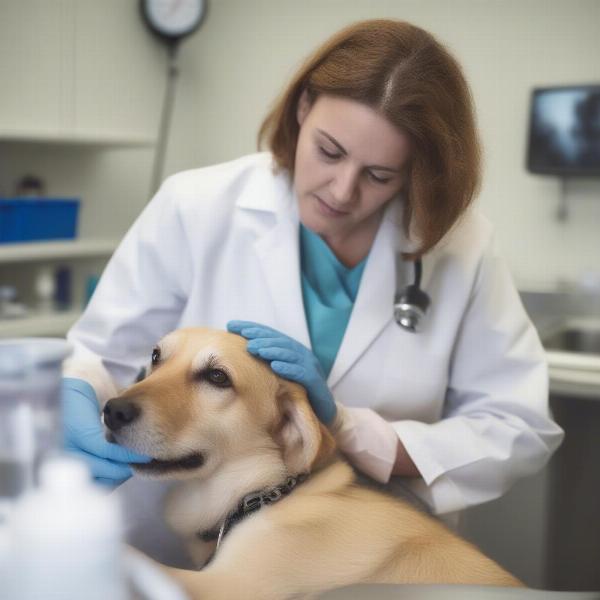Understanding the correct Piriton dose for dogs is crucial for managing allergies and ensuring their well-being. Administering the wrong dosage can be ineffective or even harmful. This comprehensive guide provides accurate and practical advice on using Piriton for dogs, covering dosage, safety, administration, and alternative options.
Understanding Piriton for Dogs
Piriton, also known as chlorphenamine maleate, is an antihistamine commonly used to alleviate allergy symptoms in humans. It can also be used in dogs to treat similar conditions, such as itching, sneezing, and watery eyes caused by environmental allergens like pollen, dust mites, or insect bites. While generally safe, it’s essential to consult a veterinarian before administering Piriton to your dog, especially if they have underlying health conditions.
Determining the Right Dogs Piriton Dose
The appropriate Piriton dosage for dogs varies based on their weight. A general guideline is 0.2-0.4 mg per pound of body weight, but it’s crucial to follow your veterinarian’s recommendation. They can determine the ideal dogs piriton dose based on your dog’s specific needs and health status. Never exceed the recommended dose, as it can lead to adverse effects. piriton dose dogs
Piriton Dosage Chart for Dogs (Consult your vet for accurate dosage)
While a general chart can be helpful, it’s vital to remember that this is just a guideline. Your veterinarian will provide the precise dosage for your dog.
- Under 10 lbs: Consult your veterinarian.
- 10-20 lbs: Consult your veterinarian.
- 20-30 lbs: Consult your veterinarian.
It’s essential to note that these are estimates, and the actual dosage will depend on your dog’s individual needs and health status.
Administering Piriton to Your Dog
Piriton is available in tablet form. You can give the tablet directly to your dog or crush it and mix it with their food. Ensure your dog consumes the entire dose. piriton for dogs
How often can I give my dog Piriton?
Typically, Piriton can be given to dogs every 8-12 hours, as directed by your veterinarian. Do not administer more frequently than recommended. can i give my dog piriton
Potential Side Effects of Piriton in Dogs
While Piriton is generally safe for dogs, some potential side effects include:
- Drowsiness
- Dry mouth
- Increased thirst
- Loss of appetite
- Vomiting
If you notice any of these side effects, contact your veterinarian immediately.
When to Seek Veterinary Attention
If your dog experiences severe allergic reactions like difficulty breathing, facial swelling, or hives, seek immediate veterinary care. These symptoms could indicate a life-threatening allergic reaction.
Alternatives to Piriton for Dogs
Several other antihistamines can be used for dogs, including Zyrtec (cetirizine) and Benadryl (diphenhydramine). Your veterinarian can recommend the best option for your dog’s specific allergy and health condition. zyrtec dosage for dogs by weight  Dog with allergies at the vet
Dog with allergies at the vet
Conclusion
Understanding the correct dogs piriton dose is essential for safely and effectively managing allergies in your canine companion. Always consult with your veterinarian before giving your dog any medication, including Piriton. They can provide tailored advice and determine the appropriate dosage for your dog’s individual needs. piriton dosage for dogs
FAQ
- Can I give my dog human Piriton? While the active ingredient is the same, it’s best to use formulations specifically designed for pets to avoid potential complications. Always consult your vet.
- What if my dog overdoses on Piriton? Contact your veterinarian or emergency animal hospital immediately if you suspect an overdose.
- Is Piriton safe for all dog breeds? While generally safe, certain breeds may be more sensitive to Piriton. Your vet can advise based on your dog’s breed.
- Can I give Piriton to my pregnant dog? Consult your veterinarian before giving Piriton to a pregnant or lactating dog.
- How long does it take for Piriton to work in dogs? Piriton usually takes effect within 1-2 hours.
- Can I give my dog Piriton and Benadryl together? Never combine medications without your veterinarian’s approval, as it can lead to dangerous interactions.
- What are the signs of an allergic reaction in dogs? Common signs include itching, scratching, sneezing, watery eyes, skin redness, and digestive upset.
ILM Dog is your trusted resource for expert advice on dog care and well-being. We offer comprehensive information on dog breeds, health, training, nutrition, grooming, and more. From puppy care to senior dog support, we provide practical guidance to help you provide the best possible care for your furry friend. For personalized advice and support, contact our team of experts at [email protected] or call us at +44 20-3965-8624. ILM Dog is dedicated to empowering dog owners worldwide with the knowledge and resources they need to nurture happy, healthy dogs.